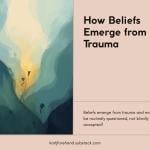Tom Stoppard’s play Rosencrantz and Guildenstern Are Dead famously re-narrates the action of Hamlet from the point of view of two minor characters on the edge of the story. I sit down today to write something about gay marriage, and I am Rosencrantz. I feel acutely my position as a minor character far from the emotional and moral action of the story. My perspective as a married, heterosexual mother comes from extreme stage left: it doesn’t, and shouldn’t, matter nearly as much as the lives at the center of the drama. I approach the topic with the irrelevance of my own views at center stage.
Nevertheless, this is my blog, so my own perspective is necessarily its subject. Over the past few weeks, events in Utah cleared the way for hundreds of gay couples to be married, and then halted the practice and cast the status of those marriages into question. These events thrust gay marriage into the spotlight yet again, particularly for Mormons who are invested in the Utah outcome. I dread these periodic irruptions — fully aware that the issue is much larger than my own dread — because they leave me emotionally wrecked and alienated from communities I value.
Complex rhetorical etiquettes, taboos on certain kind of speech in certain venues, and, probably, the Facebook algorithm conspire to move back-and-forth discussion of gay marriage largely onto Facebook, for me. I rarely discuss the topic in person with family and friends. And for whatever reason, my FB friends who support gay marriage are more vocal than those who oppose. I am not a full supporter of gay marriage, and it’s been painful to feel convicted as a bigot, a gay-hater. Yet my pain is sooo not the point here, I get that. It’s not fun to be shamed periodically as a homophobe, but I completely recognize that whatever alienation I feel pales beside the the pain and real persecution that gay men and women have been made to feel forever — especially, in recent years, by people who share my position. I am Rosencrantz, I know that.
Feeling offended on Facebook is not main the reason why I dread discussion of gay marriage, though. The main reason is it hacks my heart in half. Did I say I don’t support gay marriage? I don’t, except for all the reasons I do. I identify deeply with gay Latter-day Saints as a sister in Christ and a friend. I have watched with joy as gay Mormons have opened a more authentic conversation about their experience in the Church, as they have proved their love and loyalty and faithfulness, and as many straight LDS members have responded with acceptance and support. Too much remains undone. I wake up in the night full of anguish for young gay Mormons who fight depression and worthlessness, and for those we have lost to suicide. I see how the opportunity to marry provides stability, validation, and hope for gay couples.
Yet the same worldview that connects me to the experience of my gay brothers and sisters discomforts me when I think about the future of marriage as a social form. That discomfort is much more basic than a political opinion; indeed, I don’t resonate with — even actively reject — many of the political or religious-dogmatic arguments made against gay marriage.
It’s born instead from my deep mental model of human nature and culture. Humans, as I have known them, are thoroughly social animals, our thoughts and choices and behaviors, including those that germinate below consciousness, governed by our social context. Our most intimate thoughts are not our own, but are shaped by and shared with others. We are constrained by our gendered sexual natures, responding in complicated ways to reproductive incentives set up by social and cultural institutions — and our sexual natures influence our choices far beyond the bedroom. Our bodies are not our own, but are shared with and shaped by deep human ancestry. The organized social behaviors that we call institutions — like marriage, like the child-rearing family — do not exist outside of history, nor are they immune to the accretion of millions of individual behaviors: they are the accretion of those behaviors. Our marriages are not our own, but are shared with and shaped by the millions of marriages and representations of marriage we come to know.
Yes, marriage has changed over time; it is changing now in many ways, for many reasons. Marriage evolves because different people put the form to different uses, and we are all touched by the rippling effects of those differences. Marriage has changed chiefly at the hands of heterosexuals, of course, and gay couples are now inheriting the institution as it has been used and shaped by straights for centuries. As more gay couples marry — I accept that this is inevitable — marriage will change, for heterosexuals, too. Those changes will alter the sexual incentives and social prospects not just for gay couples and for married heterosexuals, but for single straights, and for the children conceived by single straights. I don’t presume to know what, how or when the common understanding of marriage will change as it adapts to the realities of and necessities of gay families. But it seems likely to me that marriage will exercise even less influence than it currently does over the chaotic sexual behavior of young men and women, and it seems likely to me that disadvantaged children will be the losers. I can’t prove this beforehand, I freely acknowledge, but neither can I escape it as a consequence of my basic understanding of the human world.
I have experienced two seismic shifts in worldview during my adult life. Both happened relatively quickly and effortlessly, with no anguished deliberation or even any conscious effort on my part, beyond immersing myself in a book. My inner lens on the world recalibrated below the surface, and new interpretations and understandings flowed naturally. Indeed, my mental model of the human world, described above, emerged pretty much fully formed from those shifts. The logic of this worldview, even as it provokes my discomfort with gay marriage, also predicts that my feelings on this very issue will eventually change, overwritten by a new consensus, new social norms, new buried contradictions, new justices and convenient injustices. I accept this, too, as more or less inevitable with time. That’s ironic, I guess.
But again, Rosencrantz. I’m under no illusion that these ruminations matter at all to the people who are most directly affected by the events in Utah, and I accept that reasonable people can reject my conclusions. What I won’t accept is that any person, any institution, is impermeable, closed. Nothing is self-sufficient. Everything lives in perpetual open engagement with the other perpetually open systems. That goes for Rosencrantz, and for Hamlet, too.











